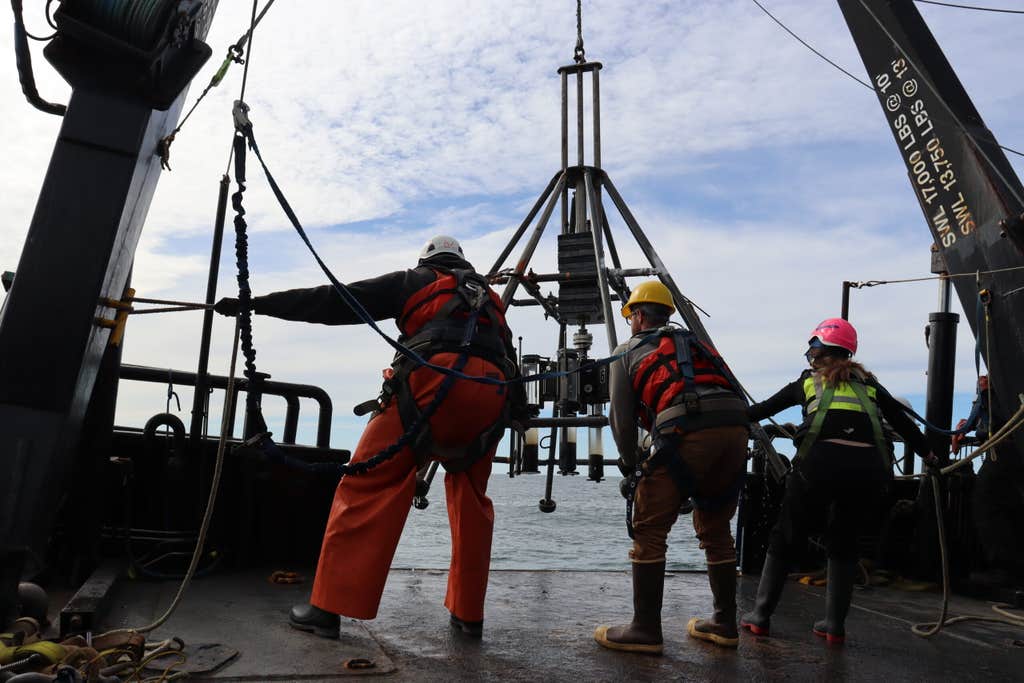
For the giant mottled eel and people born before—let’s say, 1993—Nate Spada’s TikTok is a breath of fresh water.
With the phenomenon of TikTok, a new construct of value emerged—one familiar to the terms of attention economy as we knew it, but faster, stronger, and hungrier. Its original currencies: Teenage dance videos, the souls of influencers, and all of your time and attention.
Watching TikTok for the first time feels like what I imagine it’d be to enter a black hole. In seconds, a subject (mimetic, choreographed, hilarious, or otherwise) has clawed its hooks in the walls of my attention—which soon barrels helplessly down the infinite reel—the walls stretching ever distantly from their source (me). An hour passes as minutes. I emerge on the other side, entertained, if hollowed, and unsure that I have “consumed” anything of substance, or that this concept of “substance” bears any relation to the terms of reality I have come to understand–or want to.
For those born before TikTok became a generational imperative, it might be easy to dismiss the worth of a media platform that vends videos of teenagers dancing for your dopamine.
And yet, another kind of TikTok has emerged; one which abides by the platform’s algorithm, but broadens its substance toward realms of science, philosophy, and art.
Enter the lumpfish.
Nautilus’ new TikTok ocean correspondent, Nate Spada, is a preeminent creator of scientific research documentation in the form of highly entertaining TikTok videos starring bioluminescent lumpfish, fascinating wet-lab organisms, and curiosities at sea. Spada is presently a research assistant at the Woods Hole Oceanographic Institution studying toxin-producing algae blooms and their effects on ecosystems.
Named a “part-time lumpfish influencer” by The New York Times in 2022, Spada is an unlikely candidate for TikTok stardom. Taking after his father, a commercial fisherman, Spada pursued his Masters in Marine, Estuarine, and Freshwater biology at the University of New Hampshire, reporting to advisor Elizabeth Fairchild as a student researcher and investigator at the university’s wet lab. During the early pandemic, Spada began posting videos of the marine life inside as a fun way to pass the time. With sincerity, authority, and humor, he had unknowingly perfected the recipe for virality––and was only a few lumpfish away from millions of devoted viewers.
From the wet lab, Spada introduced the world to the microcosm of creatures inside its tanks (and often, in its drains), narrating the lives and dramas of hungry lumpfish, moody crabs, and molting lobsters. And while the creatures themselves are magnificent to behold, it’s Spada’s comedic scripts (inspired by David Attenborough and Werner Herzog) that, candid or not, capture the hearts of TikTokkers.
Spada casts off the title of “influencer,” with its connotations and pressures. He thinks of himself, rather, as an educator, hoping to inspire people to care about oceans. “A lot of young people are on TikTok. If we can influence these folks––and older folks as well––to care about our oceans, then we have a brighter future.”

“I try to make my videos accessible, because my goal is not necessarily to present this information to other scientists who already know about marine biology,” Spada tells me. “I want to reach folks that may not know that a lobster can molt, or that a lumpfish can eat parasites off of farmed salmon, because it’s really cool information. And a lot of people don’t have access to the ocean, or to these institutions.”
His present responsibilities at the Woods Hole Oceanographic Institution include research cruises to Alaska, where Spada and colleagues observe algae blooms and the harmful effects they can inflict on other life forms within ecosystems. As the team collects sediment samples, sieves them, and looks for organisms in which toxins are present, Spada finds spare time to make sense of the work in the language of TikTok: Fast, funny, and easy to care about.
What’s causing this algal acceleration? And why should TikTokkers care?
“There’s a few different reasons,” Spada says. “Scientists think that a good deal of it is eutrophication,” a phenomenon in which nutrients like nitrogen and phosphorus enter a body of water at large, zealously nourishing surface algae. “In Florida, for example, there’s a lot of nitrogen and fertilizer runoff, which leaks into oceans and provides a nutrient source for these algae species.”

Another source of runoff: Clean, green, American lawns, fertilized to perfection. When these rogue chemicals reach waterways, they help blue-green (Cyanobacterial) algae to bloom, which block sunlight, smell unpleasant, and according to the EPA, produce toxins that “can harm people, animals, aquatic ecosystems, the economy, drinking water supplies, property values, and recreational activities, including swimming and commercial and recreational fishing.”
The warming conditions of climate change will benefit select species of algae—namely, the ones that like it hot. Off the coast of Florida, hot-blooming algae threatens the lives of some mammals, including manatees. But Spada’s research includes the “cosmopolitan” species inhabiting colder climates as well, like the ones off the coast of Alaska. One of their negative effects upon local ecosystems: Shellfish poisoning.
“There are indigenous communities here that don’t have the equipment to study these organisms, and what kinds of toxins they produce,” says Spada. “Working to help deliver this information to local communities is a rewarding aspect of the research.”
Nautilus is thrilled to announce Spada’s partnership on our TikTok, where you’ll find exclusive (and comedic) reports on Spada’s oceanic endeavors in real time, covering ecological observations from otherworldly eels and majestic mammals to sunsets over the Bering Strait. ![]()
Interview by C.L. Croft.
Lead image courtesy of Nate Spada.






















